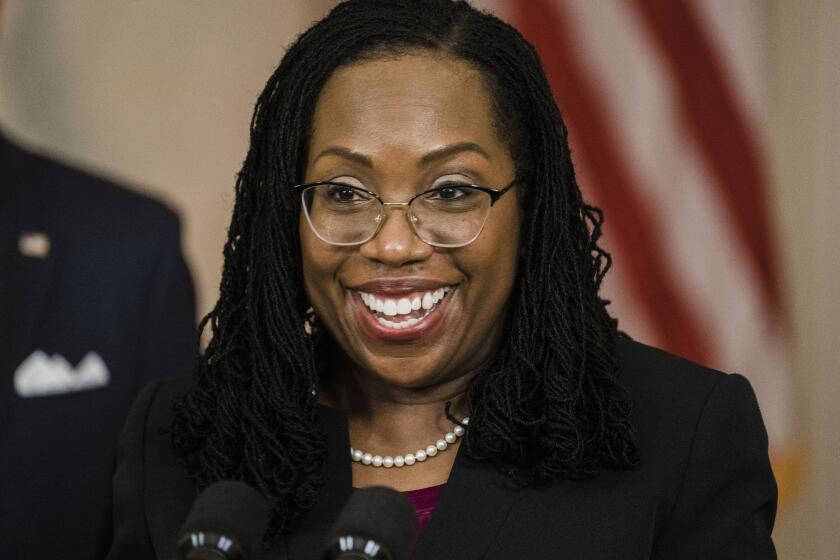In coming battle over Biden’s Supreme Court nominee, Republicans seek other targets

WASHINGTON — Mitch McConnell openly acknowledges Judge Ketanji Brown Jackson is qualified to sit on the Supreme Court.
But that doesn’t mean the Senate minority leader is backing down from her nomination battle. He is just directing his fire elsewhere.
In statements and Senate floor remarks since President Biden announced his intent to nominate Jackson to succeed retiring Justice Stephen G. Breyer last month, McConnell (R-Ky.) has signaled he is not going to try to bludgeon Jackson’s character or experience ahead of her confirmation hearings, which are set to begin March 21.
Instead, he is using the nomination as an opportunity to bash liberal activists championing her cause.
“I intend to explore why groups that are waging political war against the court as an institution decided Judge Jackson was their special favorite,” McConnell said on the Senate floor. “Like I said — I enjoyed meeting the judge. She’s clearly a sharp lawyer with an impressive resume. But when it comes to the Supreme Court, a core qualification is judicial philosophy.”
If confirmed, Judge Ketanji Brown Jackson would be the first Black woman to serve as a justice on the high court.
The messaging from McConnell highlights the difficulty his party is facing as it seeks to muster opposition to Biden’s historic nomination of Jackson, who would be the first Black woman on the nation’s highest court.
A Harvard Law School graduate and former Supreme Court clerk, Jackson has already been confirmed by the Senate for three other posts. In June, she garnered the votes of three Republican senators to affirm her appointment to the influential U.S. Court of Appeals for the District of Columbia Circuit.
“This is a very difficult candidate for them to somehow slow down” or block, said Rick Tyler, a former spokesman for Texas Republican Sen. Ted Cruz’s 2016 presidential campaign. “The Republicans are not going to give the Democrats the chance to claim that they’re racists by having a full-throated opposition against her.”
Republicans appeared to have learned that lesson after some drew sharp criticism more than a month ago when they raised questions about Biden’s long-stated pledge to nominate the first Black woman to the court.
Sen. Roger Wicker (R-Miss.) suggested Biden’s pick would be the beneficiary of affirmative action.
Cruz called Biden’s pledge “offensive” and “an insult to Black women.”
Sen. John Kennedy (R-La.) quipped that he wanted “a nominee who knows a law book from a J. Crew catalog.”
Since then, Republicans have backed off such rhetoric and have sought to sharpen their attacks on her judicial philosophy and the progressive groups that support her.
They are tacking that way, in part, because Democrats very likely have the votes to get her on the court anyway. With the Senate split essentially down the middle, if all Democrats back the nominee, as expected, Vice President Kamala Harris would break a tie.
Black Americans in the law profession worry about Biden’s overt use of race as a prerequisite for a Supreme Court nomination at such a hyper-partisan time.
Jackson’s confirmation also won’t change the ideological balance of the court, reducing the stakes of the fight. With November’s midterm elections just ahead, Republicans said they would rather focus on hammering the Biden administration with criticisms of his foreign policy and spiking inflation than make a spectacle out of a Supreme Court nominee they’re unlikely to stop.
Sen. John Cornyn (R-Texas) told reporters this month that, barring “a big surprise,” everyone on Capitol Hill is cognizant of the likely outcome.
“We know that in all probability, she’s going to be confirmed,” he said, “even if it’s just with Democratic votes.”
If anyone understands the dynamics of Supreme Court nominations, it’s McConnell. As majority leader, he succeeded in getting three of former President Trump’s nominees onto the high court despite slim Senate majorities.
In 2016, he blocked President Obama’s nomination of Merrick Garland, then an appeals court judge, to fill the seat of Justice Antonin Scalia after his death. (Unlike in Garland’s case, McConnell met and had his photo taken with Jackson after her nomination).

Before acknowledging Jackson’s qualifications on the Senate floor this month, McConnell warned that her confirmation comes during “a moment when the far left has declared open season on the very concept of judicial independence.”
“Curiously, the same radicals who want to turn Democrats into the party of court-packing also badly wanted Judge Jackson for this vacancy,” McConnell said on March 3. “It’s a matter of record that this nominee was the anointed favorite of these fringe groups. At this time last year they were already spending dark money to raise her profile.”
McConnell, who did not respond to requests for comment through his office, has leveled most of his criticism at Demand Justice, a progressive judicial advocacy group that spent six figures to boost Jackson’s nomination to the D.C. Circuit and has been vocally championing her ascent to the Supreme Court.
Brian Fallon, the group’s executive director, framed McConnell’s strategy as evidence of the strength of Jackson’s nomination.
“Republicans are trying to go after her by association and make us or our support for her nomination the issue of this confirmation process,” Fallon said in an interview. “To me, that’s a tell that there’s nothing in her record or with respect to her qualifications that they feel is useful fodder.”
Demand Justice announced a $1-million ad campaign after Jackson was nominated by Biden on Feb. 25. Fallon, however, described the money as an initial investment, noting the group spent $5 million against Brett M. Kavanaugh and $10 million against Amy Coney Barrett when they were nominated to the Supreme Court.
“I would be surprised if our investment this time around ended up needing to be that high, because I just think that this is an extremely qualified person that has a history of garnering bipartisan support,” he said. “We’ll spend what it takes, but not more than necessary.”
Whereas Republicans are now avoiding discussing Jackson’s race or gender, Democrats are touting her history-making attributes, in part, to highlight Biden’s fulfillment of a pledge he made during the 2020 presidential primary campaign to nominate a Black woman.
“You cannot ignore the historic significance of the first-ever Black woman being put on the Supreme Court,” Sen. Cory Booker (D-N.J.) said in an interview.
The White House, meanwhile, has sought to portray Jackson’s support as coming from a wide range of interest groups. It has taken pains to note, for example, that the Fraternal Order of Police and two dozen conservative leaders have issued statements supporting the nomination. Biden would like to peel off a few GOP votes to support Jackson.
If McConnell’s line of attack is any indication of the nomination’s political stakes, they might just be able to win over a few — though some Democrats are skeptical, especially since such nominations have in recent decades become increasingly partisan affairs.
“We just have to get a highly qualified, historic nominee on the bench and not turn this into a will they or won’t they give us two or three votes,” Sen. Brian Schatz (D-Hawaii) said. “It would be nice to get some Republican votes, but I expect zero, and I don’t think that will matter in the sweep of history.”
More to Read
Get the L.A. Times Politics newsletter
Deeply reported insights into legislation, politics and policy from Sacramento, Washington and beyond. In your inbox three times per week.
You may occasionally receive promotional content from the Los Angeles Times.













